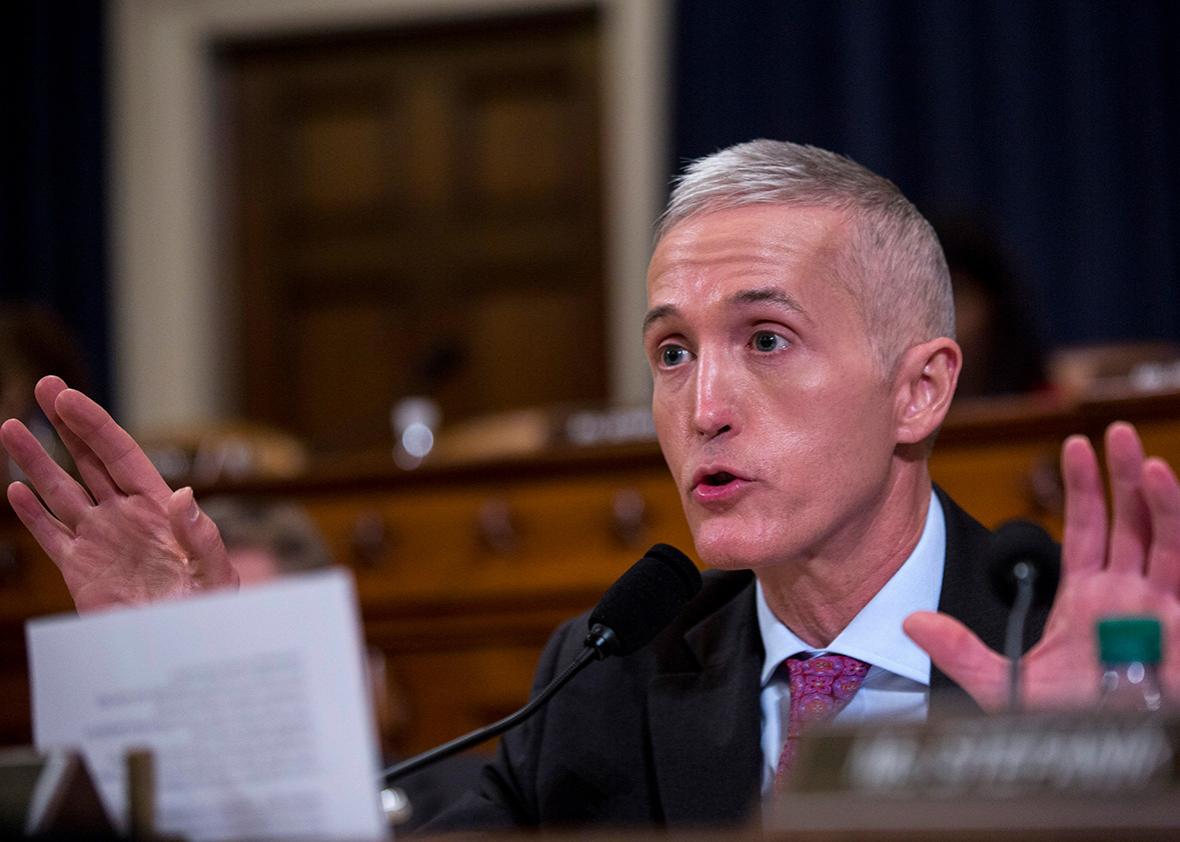Devin Nunes, the chairman of the House Intelligence Committee, will no longer lead the committee’s Russia investigation. Facing an ethics inquiry for having possibly disclosed classified information and under fire for using his position to protect the White House, Nunes is handing off the committee’s Russia probe to three Republican colleagues: Mike Conaway, Tom Rooney, and Trey Gowdy.
What will these new leaders change? Almost nothing.
Nunes is a hard act to follow. Don’t expect Conaway, Rooney, or Gowdy to sneak off to the White House grounds for secret documents and then make a show of “briefing” President Trump about them, as Nunes did. But on the central question of the investigation—whether to focus on the behavior of Trump and his associates or to turn the committee’s scrutiny toward who implicated, unmasked, and disclosed their behavior—the new leaders of the House inquiry have already shown that they’re on the side of Nunes and Trump.
Two weeks ago, in a five-hour hearing, members of the committee took turns interrogating FBI Director James Comey and National Security Agency Director Mike Rogers about Russia-related matters. Conaway used his time to challenge the intelligence community’s Jan. 6 assessment that Russia interfered in the election in part to help Trump. He argued that ascertaining the motives of foreign governments was “rarely a precise art,” and he questioned whether Rogers really agreed with the report’s conclusion. “We all agreed with that judgment,” said Comey. “We all agreed with the judgment,” said Rogers. Conaway, undaunted, pointed at the FBI director: “But you really agreed, and he almost really agreed.”
Conaway also suggested that the intelligence agencies had changed their assessment in a suspicious way. Comey and Rogers insisted they hadn’t. For several minutes, Conaway tried, without success, to find inconsistencies between successive versions of the assessment. He ended up speculating, “I’m not sure if we went back and got that exact same January assessment six months earlier, it would’ve looked the same. Because, you say, ‘We further assessed Putin and the Russian government developed a clear preference for President-elect Trump.’ ” Comey and Rogers tried to explain that what had developed was Russia’s thinking and that the intelligence assessment simply acknowledged that shift. “That was a fairly easy judgment for the community,” said Comey.
Rooney used his time to attack the Feb. 9 Washington Post story that detailed a secret phone call in December between Russia’s U.S. ambassador and Michael Flynn, who was then Trump’s incoming national security adviser. Trump’s White House was privately warned on Jan. 26 that Flynn, contrary to what he had told Vice President Mike Pence, had offered to review President Obama’s sanctions against Russia during the call. But for two weeks after the Jan. 26 warning, no visible action was taken against Flynn. It’s not surprising that somebody decided the only way to expose Flynn’s deception was to tell the press.
Rooney showed no interest in Flynn’s deceit or in his potential violation of the Logan Act, an old law that forbids diplomacy by private citizens. Instead, Rooney demanded to find out who had “unmasked” Flynn—that is, disclosed Flynn’s name in intelligence documents within the government, without necessarily releasing it to the outside world—and who had leaked the story to the Post, thereby committing, in Rooney’s words, “a serious crime under the Espionage Act.” Rooney told Comey and Rogers that if the FBI failed to prosecute and convict the leakers, Congress might curtail the agencies’ authority to conduct surveillance.
Gowdy went further. In a series of questions to Comey, the congressman advanced a case for prosecuting reporters, not just sources, for publishing stories like the Post’s. He emphasized the potential consequences: “up to 10 years in federal prison.” And he used the threat that Congress might cut back the agencies’ surveillance powers to squeeze Comey for information on who the leakers could be:
Director Comey, given the fact that you and I agree this [surveillance authority] is critical, vital, indispensable: A similar program is coming up for reauthorization this fall with a pretty strong head wind right now. It would be nice to know the universe of people who have the power to unmask a U.S. citizen’s name. Because that might provide something of a roadmap to investigate who might’ve actually disseminated [it].
Throughout the hearing, Gowdy refused to say Flynn’s name, arguing that it should never have been disclosed. But that didn’t stop Gowdy from reading the names of several Obama administration officials and asking Comey whether each of them—former Attorney General Loretta Lynch, CIA Director John Brennan, President Obama himself, and others—could have been the leakers. Gowdy devoted a separate question to each of these people—“Would former White House adviser Ben Rhodes have access to an unmasked U.S. citizen’s name?”—casting suspicion on them while offering no evidence. He wrapped up the hearing by calling on Comey to open a criminal investigation of the Flynn leak.
Conaway, Rooney, and Gowdy might not have the Nunes baggage, but they won’t run the Russia investigation any differently from the way Nunes did. They don’t want to accept the intelligence assessment that Russia tried to help Trump. They think Flynn is an innocent patriot, despite the hundreds of thousands of dollars he secretly took from Russian and Turkish interests. They see Trump and his aides as the victims and Obama and his aides as the suspects. The committee whose investigation they’re taking over still has 13 Republicans and nine Democrats, and that’s how it behaves. It’s not an intelligence committee. It’s the committee to re-elect the president.
